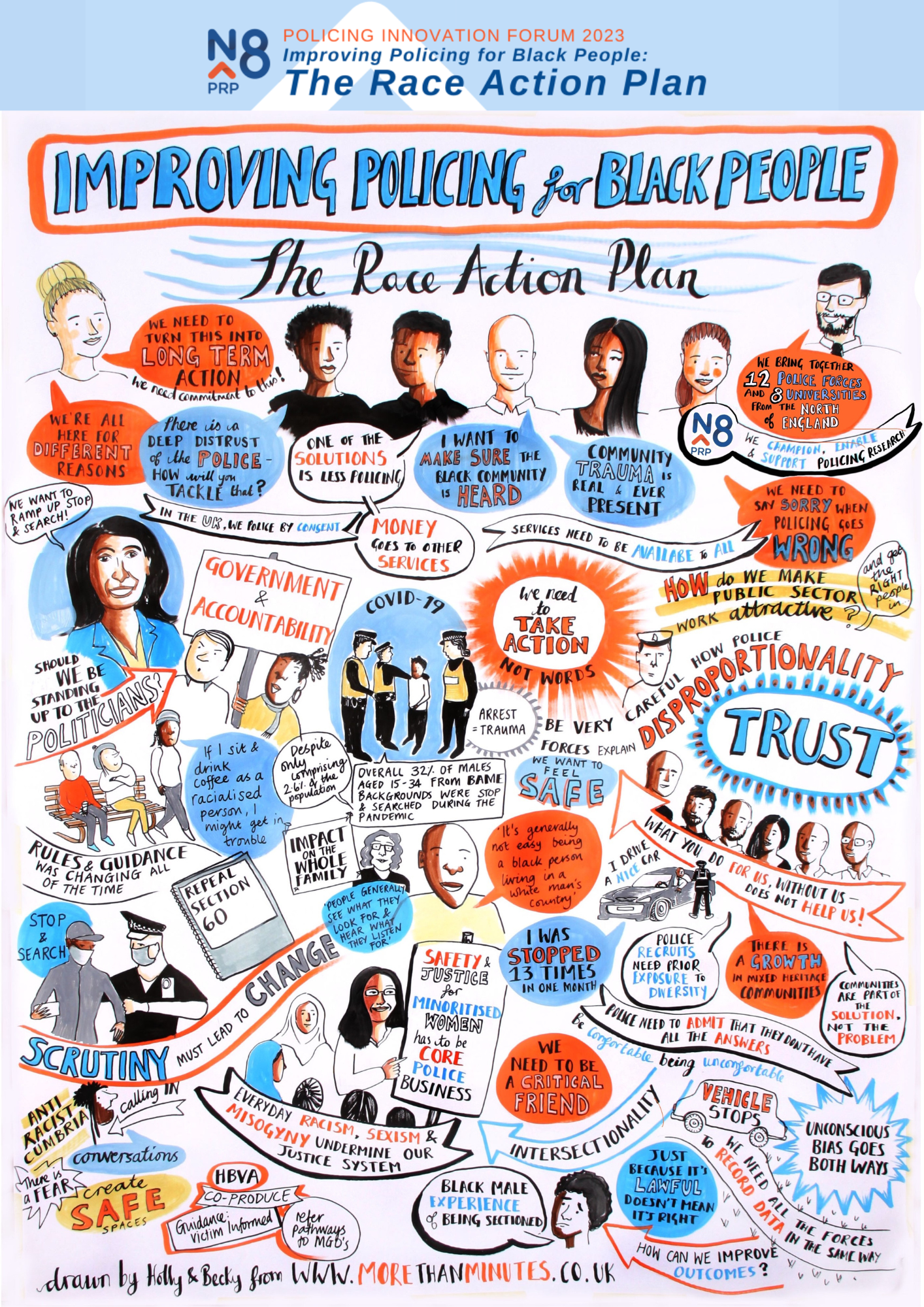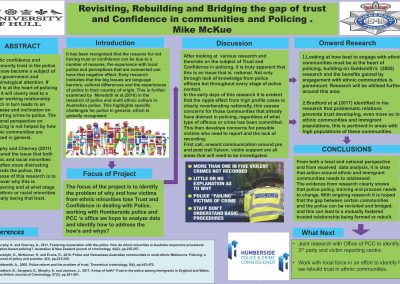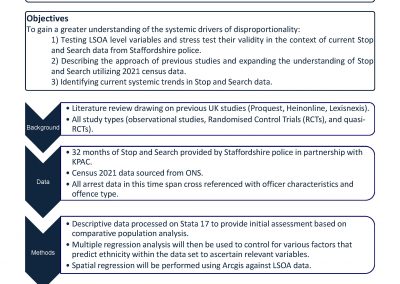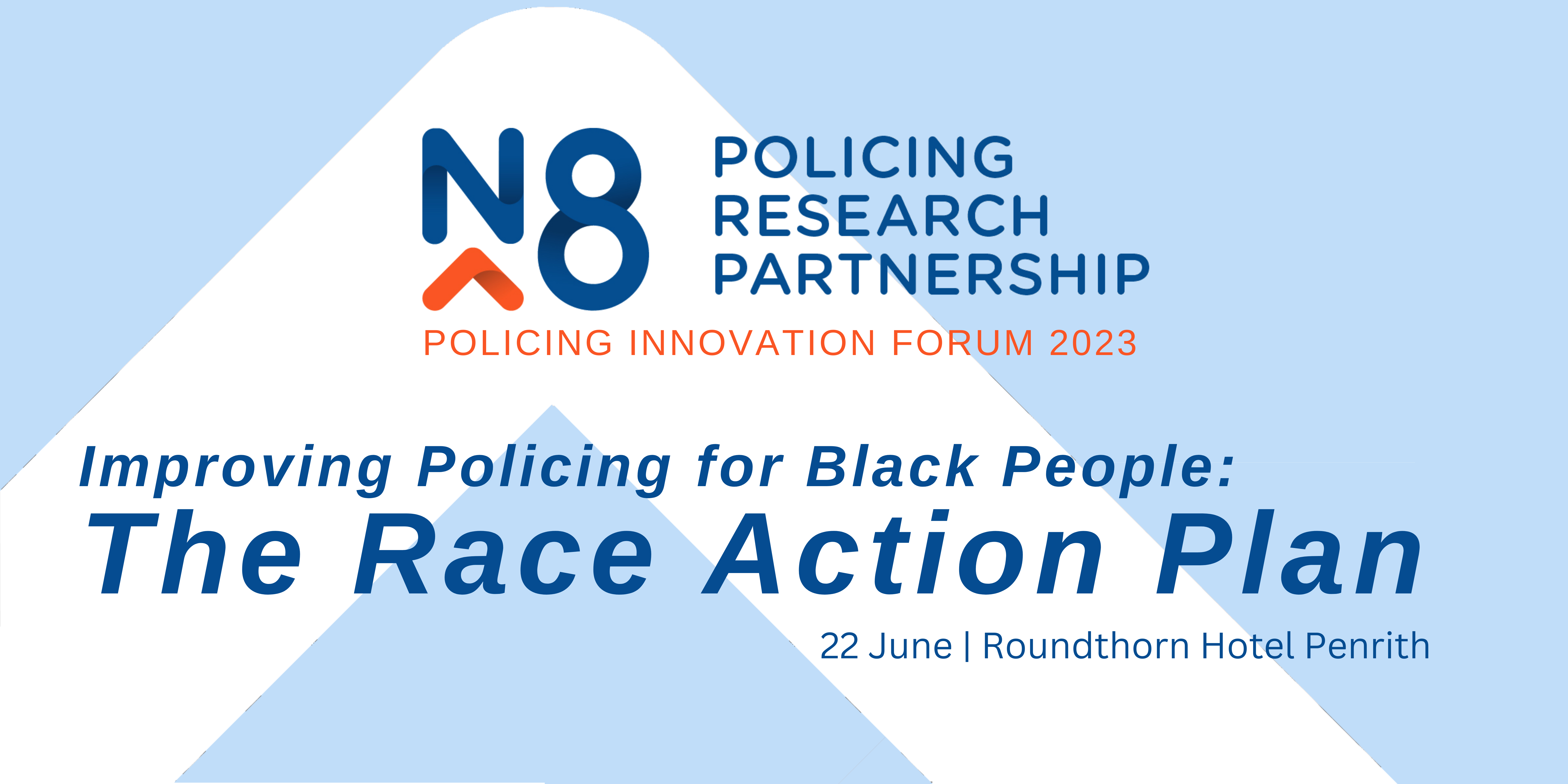
The N8 PRP Policing Innovation Forum 2023
Improving Policing for Black People: The Race Action Plan
22 June 2023 | Penrith
The eighth annual N8 PRP Policing Innovation Forum was held in Penrith on 21 June, on the theme of Improving Policing for Black People: The Race Action Plan.
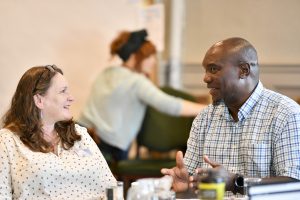
Delegates in discussion at the Forum @Stuart Walker Photography.
Around 60 people gathered at the beautiful Roundthorn Hotel to discuss research, activism and innovative projects related to the 4 workstreams of the NPCC’s Police Race Action Plan: Represented, Not Over-policed, Included, and Not Under-Protected. Representatives from academia, police, policy organisations, non-profits, and local government took part in panel and group discussions, sharing experience and best practice, identifying knowledge gaps, and finding new opportunities for collaboration.
Morning Session
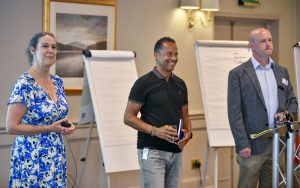
Ngaire Waine, Nick Glynn and Paul Thomas answer questions. @Stuart Walker Photography.
Delegates were welcomed to Cumbria by ACO Nancie Shackleton, followed by an introduction to N8 PRP and the Innovation Forum by Prof Geoff Pearson. The Forum then heard from the NPCC’s Ch. Supt Paul Thomas and ISOB’s Nick Glynn on the progress and priorities of the Race Action Plan, followed by a highly engaged Q&A session.
Ch Supt. Ngaire Waine chaired the first panel session of the day, Overpoliced: What We’ve Learned from Covid 19. Research on the nature and causes of disproportionality was presented by Professor Iyiola Solanke, Professor Susan McVie, and Dr Liz Turner.
Engagement and Suspicion
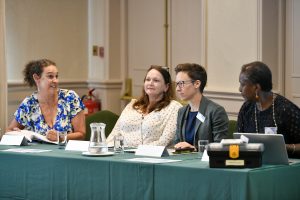
Panel on what Covid taught us about disproportionality, ft. (l-r) Ngaire Waine, Susan McVie, Liz Turner, and Iyiola Solanke
After a coffee break, Lancashire Constabulary’s Rozila Kana led a panel discussion about lived experience of policing and being policed as a person of colour, with contributions from community leaders and serving police officers. Next, Dr Mike Rowe chaired the final panel session of the day, Grounds for Suspicion: Stop and Search. IOPC’s Andrea Banham presented the work behind the IOPC’s recent Stop and Search Guidance, Dr Estelle Marks discussed the practice of ‘suspicionless’ search and called for the abolition of Section 60, and finally Dr Sharda Murria presented her research on the role of Body Worn Video in Scrutiny Panels and recommendations for how to make these panels more effective.
Poster Exhibition
Over lunch, delegates had the opportunity to review the prize-winning posters presented by Mike McKue and Dominic Cox. The researchers both received 6 books of their choosing, generously donated by Routledge, who also provided delegates with a 20% discount for books ordered on the day.
Afternoon Session
The afternoon began with a keynote from Professor Aisha K. Gill, Race, policing, and gender: Intersectional feminist analysis of sexual abuse in South Asian communities. Professor Gill shared findings on research about the causes of under-reporting of rape and sexual violence in South Asian communities in Britain, particularly the reasons women in those communities have a lack of trust and confidence in police.
Trauma and Trust
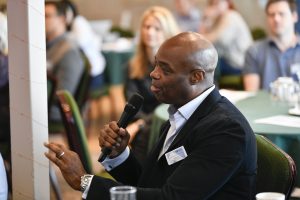
There were highly engaged Q&A sessions throughout the day. @Stuart Walker Photography.
During the Q&A, one police delegate raised the point Professor Gill had made that women who came forward could fear being criminalised or treated as suspicious, for example if they were asked whether they were a citizen or legally resident. The delegate pointed out that they needed to know citizenship status as currently non-citizens are excluded from support to access refuges and support services. This led to a discussion about how police prioritise victims whilst operating within this constraint – for example, by being sensitive to how victims experience this question, taking time to explain the reason for the question, and providing reassurance. The need for continued political action by stakeholders outside the police if these constraints were to be changed.
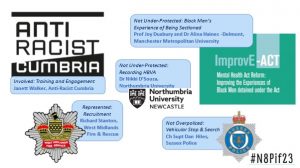 For the final session of the day, delegates split into 5 groups for roundtable discussions with projects looking at how to improve policing for black people with regards to engagement and training, recruitment, recording honour based violence and abuse, being sectioned under the mental health act, and vehicular stop and search.
For the final session of the day, delegates split into 5 groups for roundtable discussions with projects looking at how to improve policing for black people with regards to engagement and training, recruitment, recording honour based violence and abuse, being sectioned under the mental health act, and vehicular stop and search.
Big Ideas
The main themes of the day were trust, scrutiny, accountability, engagement, and intersectionality.
Delegates focused on practical questions, such as setting goals for measurable reductions in disproportionality, how police could implement trauma-informed procedures for interviews and arrests, whether knowledge and experience with a community other than ones’ own should be an essential requirement for recruitment, how scrutiny panels can led to meaningful accountability, and the importance of enabling and valuing engagement by providing funds and schedules that give people the chance to participate.
Ideas and Actions
Following the Forum, delegates were asked what ideas and actions they had taken from the event. Respondents said they had come away with ideas for future events, research projects, and publications, increased awareness of the subject and plans for further reading.
What I took from the Forum were ideas and recommendations from the small groupwork exercise, as the three questions posed led you to be more forward-thinking and action-orientated in terms of impact and research ideas for the future – all actionable ideas!
Dr Nikki D’Souza, Northumbria University
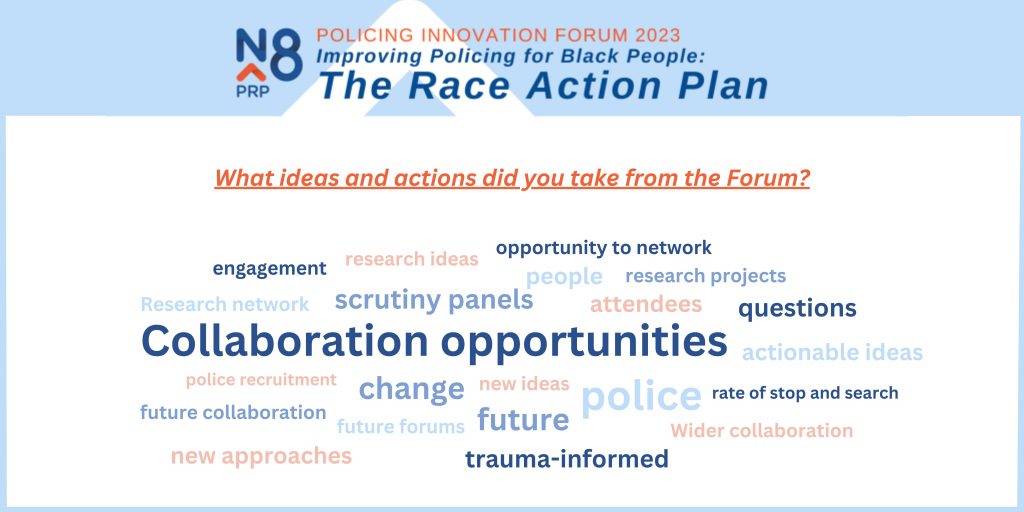
Delegates also said they planned to look into changes in recruitment, engagement, and providing legal training for stop & search scrutiny panels.
The most common gain cited by delegates was collaboration and networking opportunities, and many planned to follow up with new contacts on new projects and research questions.
The discussion was captured by Becky Bryson and Holly Langley from More than Minutes. The poster, below, captures the major points from the day and the diversity of voices that were included.
The presentations from the day are linked at the top of this report – if you would like more information on any of the presentations, please contact the relevant speaker or get in touch with the N8 PRP project manager @ helen.gordon-smith@manchester.ac.uk.
